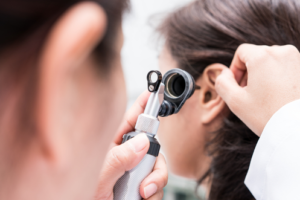 Hearing Tests
Hearing Tests
Hearing loss can be due to a number of different reasons. The first step in identifying what is happening is to arrange a hearing test.
When should I have a hearing test?
If you are experiencing problems with your hearing, you should think about having a hearing test. Things to look out for are:
- Not being able to hear people clearly
- Asking people to repeat themselves
- Needing the volume on the television or radio turned up loud
- Having trouble hearing the doorbell or telephone
- Hearing a buzzing or whistling sound in your ears
- If you experience any of the above, make an appointment to see your GP. Your GP will check your ears for possible infections or blockages.
If you ears are not clear this will need to be sorted first. You may need to have wax removed or clear an ear infection. Many beneficiaries have narrow ear canals and build up of wax is common. This needs to removed. Your GP may refer you to your nearest hospitals Ear Nose and Throat (ENT) department if you have an issue that needs investigating further. They may:
- Refer you for a hearing screening test
- Refer you for a full hearing test
If your GP finds no signs of blockages or infections they will refer you for a hearing test.
Ear Wax
Ear wax keeps our ears clean and healthy. It usually works its way out of the ears by itself, but sometimes too much wax can build up and block the ears. Read the RNID guidance which explains how a build-up of ear wax is treated.
When does hearing change?
Hearing loss happens when signals cannot reach your brain. This can be due to:
- Sensorineural hearing loss (sudden in one ear) – caused by damage to the hairs inside the inner ear or the nerve which takes sounds from the ear to the brain (the auditory nerve). It often comes with age, but can also happen due to injury.
- Presbycusis, or age-related hearing loss. Usually it affects high sounds, and happens in both ears.
- Conductive hearing loss (gradual in one ear) – happens when sounds cannot pass from your outer ear to your inner ear. This happens temporarily because of blockages like earwax or a treatable middle ear infection, but this kind of hearing loss can also occur permanently through injury or as a result of certain conditions.
